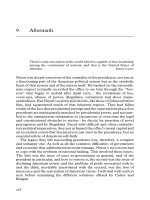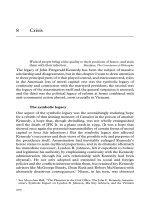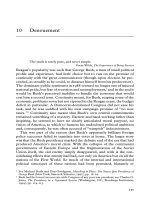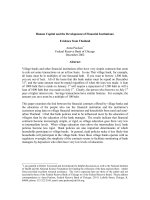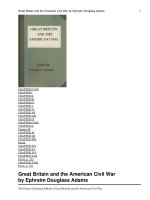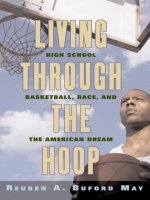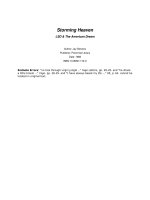Moral capital and the American presidency - Crisis
Bạn đang xem bản rút gọn của tài liệu. Xem và tải ngay bản đầy đủ của tài liệu tại đây (104.92 KB, 18 trang )
8 Crisis
Wicked people bring a like quality to their positions of honor, and stain
them with their infection.
Boethius, The Consolation of Philosophy
The legacy of John Fitzgerald Kennedy has been the subject of massive
scholarship and disagreement, but in this chapter I want to draw attention
to three principal parts of it that played central, and interconnected, roles
in the American loss of moral capital: one was the symbolic legacy of
continuity and connection with the martyred president; the second was
the legacy of the assassination itself and the general suspicion it aroused;
and the third was the political legacy of reform at home combined with
anti-communist action abroad, most crucially in Vietnam.
The symbolic legacy
One aspect of the symbolic legacy was the astonishingly enduring hope
for a rebirth of that shining moment of Camelot in the person of another
Kennedy, a hope that, though dwindling, was not wholly extinguished
until the death of JFK Jr. in a plane crash in 1999. (It was a hope that
showed once again the potential transmissibility of certain forms of moral
capital to bona Wde inheritors.) But the symbolic legacy also aVected
Kennedy’s successors and their views of the possible role and purposes of
the presidency itself. Assassination had inevitably enlarged Kennedy’s
heroic status to semi-mythical proportions, and in its dramatic aftermath
his immediate successor, Lyndon B. Johnson, felt it expedient to bolster
and legitimize his authority by emphasizing continuity with the Kennedy
administration (though his own relationship with Kennedy had been
abysmal). He not only adopted and extended its social and foreign
policies and the conXicts inherent within them, but retained key Kennedy
advisers like McGeorge Bundy, Dean Rusk and Robert McNamara with
ultimately disastrous consequences.
1
Nixon, in his turn, was obsessed
… See Moya Ann Ball, ‘‘The Phantom in the Oval OYce: The John F. Kennedy Assassin-
ation’s Symbolic Impact on Lyndon B. Johnson, His Key Advisers, and the Vietnam
200
with the image of presidential leadership that his old rival for the presi-
dency had bequeathed, craving the adulation given to Kennedy and
desperate to be seen as at least the equal of Kennedy in terms of heroic
leadership.
2
Virtually every president (or presidential aspirant) thereafter
felt constrained to respond in some fashion to the dominating image of
Kennedy. Democrats in particular sought to rekindle the presidential Wre
that Kennedy had lit, or at least to associate themselves with his myth
through their speeches, appearance or programs.
3
The assassination legacy
The irony of the symbolic legacy was that it was itself deeply implicated
in the progressive disheartening of America. An important element in
this was the legacy of the political assassination itself which set an un-
happy modern precedent for other attempts, successful in the cases of
Martin Luther King and Robert Kennedy, unsuccessful in the case of
Ronald Reagan. It produced a climate where democratic leaders needed
a virtual praetorian guard to ensure security and where a Colin Powell,
who could well have been the nation’s Wrst black president, was reported-
ly dissuaded from running because of his family’s fear for his life. Worse,
it contributed to a general sense that something was deeply wrong with
America. (‘‘I used to love my country,’’ a young Divinity student said to
me after the death of Bobby Kennedy, ‘‘but now I hate it. We kill all our
best people.’’) It was a feeling heightened by the miasma of suspicion
that eventually arose around the Kennedy killing and also that of King.
There is no need to rehearse the endless speculations, theories and
‘‘proofs’’ adduced in articles, books and movies that began to Xow after
1967,
4
nor to consider their credibility or lack of it. The point is that the
dissatisfaction with the single-assassin account became, in both cases,
Decision-Making Process,’’ Presidential Studies Quarterly 24(1)(1994), pp. 105–119; also
Ball, Vietnam-on-the-Potomac (New York, Praeger, 1992).
For an account of the relationship between Nixon and Kennedy see Christopher Mat-
thews, Nixon and Kennedy: The Rivalry that Shaped Cold War America (New York, Simon
& Schuster, 1996). See also Jon Roper, ‘‘Richard Nixon’s Political Hinterland: The
Shadows of JFK and Charles de Gaulle,’’ Presidential Studies Quarterly 28(2) (Spring
1998), pp. 422–435.
À See Paul R. Henggeler, The Kennedy Persuasion: American Presidential Politics Since JFK
(Chicago, I. R. Dee, 1995) (expanded version of his 1991 book, In His Steps: Lyndon
Johnson and the Kennedy Mystique).
à The Xood was started with the controversy surrounding William Manchester’s Death of a
President (Harper & Row, 1967). Jim Garrison’s On the Trail of the Assassins: My Investiga-
tion and Prosecution of the Murder of President Kennedy (New York, Sheridan Square Press,
1988), turned by Oliver Stone into the movie JFK in 1991, was the most commercially
successful of the assassination plot books, but there are more than 300 others listed by the
John F. Kennedy Library in Boston.
201Crisis
widespread and enduring, and that people became increasingly willing to
entertain the thought that dark and complex forces might be at work
within their government.
5
Improbable (but conceivable) alliances of
Cuban exiles, communist agents, the MaWa, the CIA and even Vice-
President Johnson were alleged to have generated devilish plots and
murders. The long-range psychological eVect of the conspiracy theories
was to create the fear that a terrible gulf existed between the external
actions of American politics – the schoolbook accounts of how demo-
cratic government worked – and the way it really operated. Beneath the
surface there appeared to be a play of secret and sinister forces beyond
the power of the democracy to control. Congressional investigations
would reveal in 1975–76 that US intelligence agencies were indeed guilty
of many abuses at home and abroad, thus lending credence to this fear. It
would soon become a cliche´ of Wctional thrillers and movies that the bad
guys would turn out in the end to be a rogue agency of the government
itself. In such an atmosphere, the traditional repositories of public trust
became increasingly suspect.
These developments played a part in undermining the symbolic legacy
of Kennedy, for the revelations of a gap between public image and
internal reality went right to the top. The literature on the president
himself up until 1970 had been mostly commemorative and laudatory,
dominated by keepers of the Xame like Schlesinger and Theodore Soren-
sen (the latter was Kennedy’s speech-writer, who said of the Kennedy
legacy that it could be no more summed up in a book ‘‘than a Mozart
concerto can be summed up by . . . black notes on white score paper’’).
6
The release of the Wrst Kennedy papers in 1969 in the midst of the
Vietnam maelstrom inaugurated a substantial revisionist historiography.
AdiVerent and disillusioning picture of the hero began to emerge. He
was: a virtual invalid kept going by injections of corticosteroids and
amphetamines; an obsessive womanizer incapable of emotional connec-
tion with women; a man with MaWa connections, whose election in 1960
had been bought with the help of gangsters; a man as fatally seduced by
seedy underworld glamor as by the glitter of the Hollywood stars he
befriended and bedded; a man who condoned and perhaps ordered
assassination attempts of leaders in Cuba, South Vietnam, the Congo and
the Dominican Republic; a man who had put the world at hazard by
himself bringing on the Cuban missile crisis through his obsession with
overthrowing Castro; and a man who, far from pushing civil rights, had
incurred the permanent contempt of Martin Luther King for his dilatori-
Õ An exception was Gerald Posner’s Case Closed (New York, Random House, 1993), the
only book to argue that Oswald was the lone assassin.
ΠTheodore C. Sorensen, The Kennedy Legacy (New York, Macmillan, 1969), p. 18.
202 Moral capital and the American presidency
ness and cowardice in confronting the Dixiecrats.
7
Part of Nixon’s fasci-
nation with Kennedy, it turns out, lay in the latter’s ability to get away
with dirty tricks while maintaining a pristine image, and much of Nixon’s
bitterness was the diVerential treatment he felt he received for his own
similar, and perhaps lesser, crimes.
8
The sullying of the Kennedy myth was general. Robert was implicated
with his brother in most of the above allegations, but the entire Kennedy
clan was variously impugned. The patriarchal father, Joseph, was an
ex-Nazi sympathizer, political briber and all-round bastard who, among
other things, goaded his sons to compete in sexual conquests. Edward,
next-in-line for the succession after Bobby, was undone by the womaniz-
ing learnt at his father’s knee when an accident connected with a sexual
liaison at Chappaquiddick eVectively ruined his chance ever to be presi-
dent. America’s love aVair with widow-heroine Jackie ended abruptly
when she married Greek billionaire Aristotle Onassis, and disenchant-
ment was deepened by stories of compulsive spending that strained even
that plutocrat’s pocket and patience. Seldom has the disparity between
beautiful facade and sordid interior been so dramatically exposed as in the
case of the Kennedys. Given the attendant disillusionment, it was per-
haps not to be expected that faith in the nation’s ‘‘best and brightest’’
would ever again be so readily and innocently invested. But there were
larger forces involved in this disillusionment that multiplied the eVect.
The legacy of reform at home: anti-communism abroad
The obsessive chipping at the Kennedy shrine began in, and was signiW-
cantly stimulated by, a national atmosphere radically diVerent from that
which Kennedy himself had inhaled. It was the era of Johnson, Nixon and
the trauma of Vietnam, of the clash of a ‘‘counter-culture’’ with the
shocked, confused, resistant core of conservative America. And this era
too was part of the Kennedy legacy, or more accurately of that Cold War
œ Just a few of the books making such allegations/revelations are: Thomas Reeves, A
Question of Character: A Life of John F. Kennedy (London, Bloomsbury, 1991); Richard
Reeves, President Kennedy (New York, Simon & Schuster, 1993); Seymour Hersh, The
Dark Side of Camelot (New York, HarperCollins, 1998); Thomas G. Paterson (ed.),
Kennedy’s Quest for Victory: American Foreign Policy, 1961–1963 (New York, Oxford Univer-
sity Press, 1989); Aleksand Fursenko and Timothy Naftali, ‘‘One Hell of a Gamble’’:
Khrushchev, Castro and Kennedy (New York, Murray, 1997); Ernest May and Philip
Zelikow (eds.), The Kennedy Tapes: Inside the White House During the Cuban Missile Crisis
(Harvard University Press, 1997); Taylor Branch, Pillar of Fire: America in the King Years
(New York, Simon & Schuster, 1998).
– According to Henry Kissinger, Nixon spent hours every week ruminating on the ruthless
tactics and gimmicks he believed had made the Kennedys so formidable; The Years of
Upheaval (Boston, Little, Brown, 1982), p. 1182.
203Crisis
legacy transmitted through and symbolically embodied in Kennedy. Dur-
ing Johnson’s term the threat from the Soviets appeared to be receding
and the Chinese–Soviet split made the enemy seem less monolithic. But
old patterns of thought persisted, and Washington remained deeply
concerned about communist China and its support for revolutionary
movements worldwide. A new containment policy now settled on China
and its clients in South-East Asia. America had maintained a low-level
involvement in South-East Asia since 1950, but JFK had increased
American military support (in the shape of some 16,000 ‘‘advisers’’)to
Laos and South Vietnam to prop up regimes under threat from national-
ist insurgents backed by China. Kennedy-philes would later argue that
their hero would never have committed America to a major war in
Vietnam, and it was true that he was unhappy about involvement there.
Nevertheless, Lyndon Johnson, responding to the ongoing weakness and
failure of South Vietnamese regimes, was continuing and furthering a
process already begun by Kennedy.
Johnson, the big Texan, was at least as macho a Cold Warrior as his
predecessor and much more determined to get his ‘‘fellas’’ out into the
jungles of Vietnam to ‘‘whip hell out of some communists.’’ He wanted to
prevent the Chinese and ‘‘the fellas in the Kremlin’’ from thinking
Americans were ‘‘yellow and don’t mean what we say.’’
9
But Johnson
merely wanted to win the war as rapidly and decisively as possible so he
could concentrate on his domestic program. He was in truth no happier
than Kennedy about the Vietnamese entanglement, and was presciently
warned in 1964 of the likely consequences of escalation by his own
Under-Secretary of State, George Ball. The White House tapes revealed,
many years later, that even as he drove relentlessly on with the military
build-up in Vietnam, Johnson thought that country ‘‘the biggest damn
mess’’ he ever saw and not worth Wghting for.
10
However, he had sur-
rounded himself with Kennedy men resolutely committed to their mas-
ter’s course, and there was always Robert Kennedy, the man LBJ feared
most, waiting in the Democratic wings should Johnson stumble. Most
important, though, was the memory of Truman, China and McCarthy-
ism, which haunted Johnson as it had haunted Kennedy. What would
Congress and the country do to a president who showed himself ‘‘soft on
communism’’? Johnson could not aVord to ‘‘lose’’ Vietnam to the mortal
enemy as Truman had ‘‘lost’’ China. The rigidiWed American virtue
identiWed with anti-communism thus led the nation into a decade of
— CitedinMichaelH.Hunt,Lyndon Johnson’s War: America’s Cold War Crusade in Vietnam,
1945–1968 (New York, Hill and Wang, 1996), p. 79.
…» Michael Beschloss (ed.), Taking Charge: The Johnson White House Tapes (New York,
Simon & Schuster, 1997). Reported in New York Times, 18 March 1997,p.12.
204 Moral capital and the American presidency
destructive and futile warfare that would induce a loss of faith in Ameri-
can virtue and provoke something like a revolution at home.
Johnson failed to take his courage in his hands and withdraw because
he dreamed of domestic glory through the expansion of Kennedy’s re-
form program. Johnson’s Great Society project was made feasible by his
landslide victory in the 1964 elections which had also greatly
strengthened the liberal Democratic contingent in the House of Repre-
sentatives, but he knew it would be destroyed in the political furore that
Republicans would foment if he abandoned Vietnam. The terrible irony
for Johnson was that the necessary price of his domestic program was
commitment in Vietnam, while the escalating cost and distraction of the
war inevitably crippled that program which Wzzled after the Wrst astonish-
ing burst of achievement in 1964–65. He might have solved the problem
by doing as the Pentagon urged and asking Congress for a tax increase in
1966, thus covering the costs of both war and reform, but here the
inherent weakness of the presidency came into play. Johnson had spent a
large part of the previous year and a vast amount of political capital
persuading Congress to grant a tax cut, and he had not the heart to
recommence the enervating process of seeking a reversal – and probably
could not have got the votes if he had.
11
Unable to relinquish either his
Great Society or the war, he pursued inXationary spending that would
have dire economic consequences in the 1970s, while feeling compelled
to hide the full truth of the situation from the public and from Congress.
It was also lack of presidential power – the power to declare war without
Congressional approval – that led Johnson to use deception to achieve
escalation of American military commitment in Vietnam. The device he
employed (used only moderately by previous presidents) involved seeking
a ‘‘blank check’’ from Congress for the contingent use of force in an area
where American interests had been threatened by a local disturbance. In
1964,an‘‘incident’’ of North Vietnamese aggression in the Tonkin Gulf
provided the pretext, and on the strength of it Johnson gained nearly
unanimous Congressional approval for whatever action he deemed
necessary. He used the Tonkin Gulf resolution to pursue, not the limited
action Congress had envisaged, but what was in eVect an undeclared war.
Resentment at this trickery when it was Wnally revealed fed into growing
antiwar sentiment, stimulating moves by Congress to assert some of the
constitutional prerogatives in foreign policy it had hitherto largely ceded
to the executive. Thus the actions of the so-called Imperial Presidency
…… GeoVrey Hodgson, All Things to All Men: The False Promise of the Modern American
Presidency (London, Weidenfeld and Nicolson, 1980), p. 48. See also Richard E. Neus-
tadt, Presidential Power and the Modern Presidents: The Politics of Leadership from Roosevelt to
Reagan (New York, Free Press, 1990), pp. 210–211.
205Crisis
provoked a Congressional reaction aimed at curtailing presidential
powers in the only arena that imperial powers could be displayed, foreign
aVairs.
Johnson’s deceptions did not cease with this initial piece of trickery. In
an eVort to protect his domestic objectives, he went on for as long as he
could concealing from both the legislature and the public the real extent
and cost of America’s deepening military involvement during 1964–65.
Likewise, he systematically obscured the infuriating failure of South
Vietnamese governments, enmeshed in their own internecine conXicts, to
establish a viable nation capable of standing on its own feet and Wghting
its own Wghts. Secrecy no doubt came naturally to LBJ, but concealment
and deception were also an integral part of Cold War mentality and its
obsession with espionage. Former presidents, not least Kennedy, had
been just as cavalier as Johnson about deceiving Congress when it suited
them, and he, as former Democratic Senate majority leader, knew better
than most the capacity of Congress to frustrate presidential action. But in
the bitter atmosphere created by Vietnam, deceptive executive conduct
created strong congressional antipathy and suspicion that would lead, in
Nixon’s time, to attempts to monitor more closely the secret activities of
the executive and its intelligence agencies.
Johnson’s strategy of deception bought him short-term political ma-
neuverability at the price of long-term erosion of public and Congres-
sional conWdence. Not all his considerable cunning, blustering and
bullying could in the end conceal the fact that America was hopelessly
stuck in the quicksands of Vietnam. In the end his presidency would sink
in the quagmire, but the cost was not only Johnson’s. According to Brian
VanDeMark, Johnson’s strategy of concealment:
tarnished the presidency and damaged popular faith in American government for
more than a decade . . . LBJ’s decision, however human, tragically undermined
the reciprocal faith between President and public indispensable to eVective gov-
ernance in a democracy. Just as tragically, it fostered a pattern of presidential
behavior which led his successor, Richard Nixon, to eventual ruin amid even
greater popular alienation.
12
To this I would enter the caveats that Nixon’s model was Kennedy as
much as Johnson, and that the American loss of faith cannot be explained
simply by reference to Johnson’s and Nixon’s concealments and crimes,
causally important though these were. The dereliction of a successive pair
of delinquent incumbents should not, I have argued, necessarily seriously
… Brian VanDeMark, Into the Quagmire: Lyndon Johnson and the Escalation of the Vietnam
War (New York, Oxford University Press, 1988), p. 217. See also Doris Kearns, Lyndon
Johnson and the American Dream (New York, Alfred A. Knopf, 1976); and Robert A.
Caro, The Years of Lyndon Johnson (2 vols., New York, Knopf, 1982–84).
206 Moral capital and the American presidency

